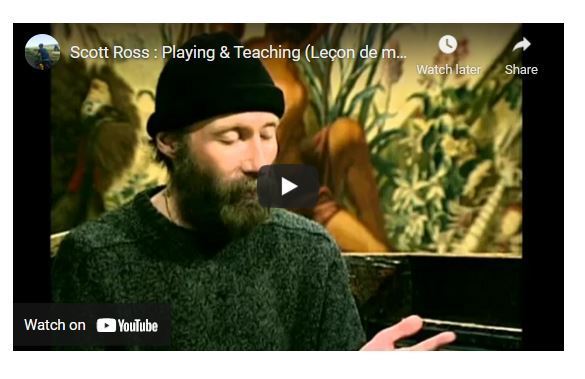
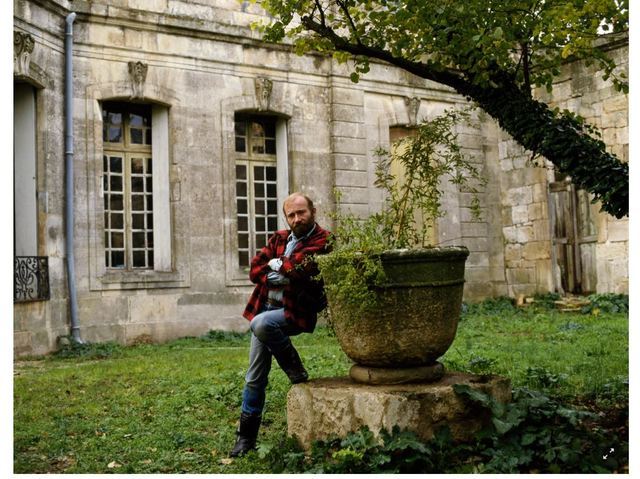
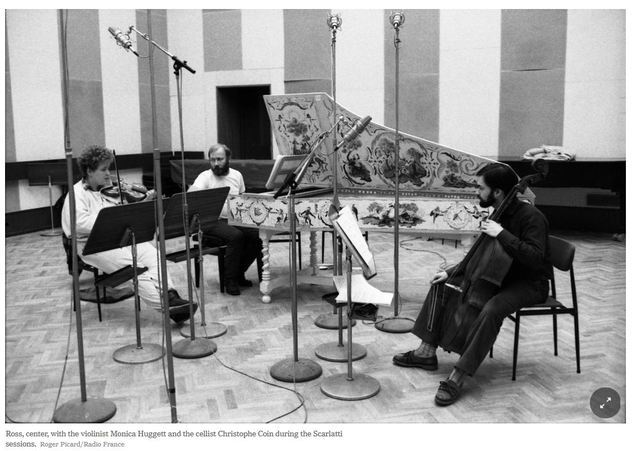
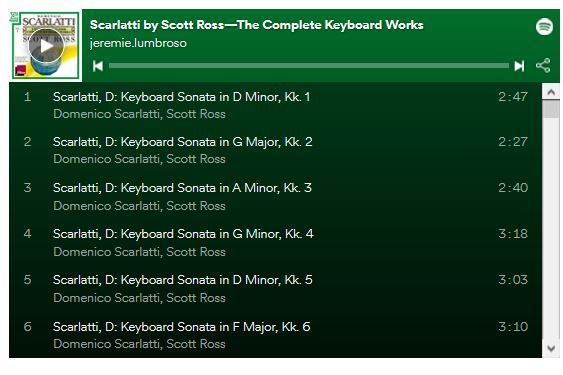
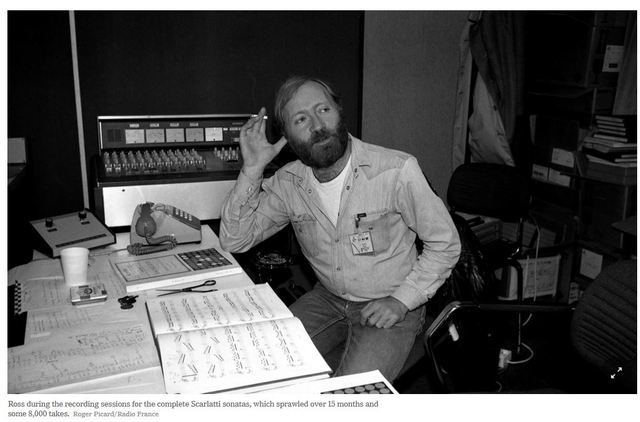
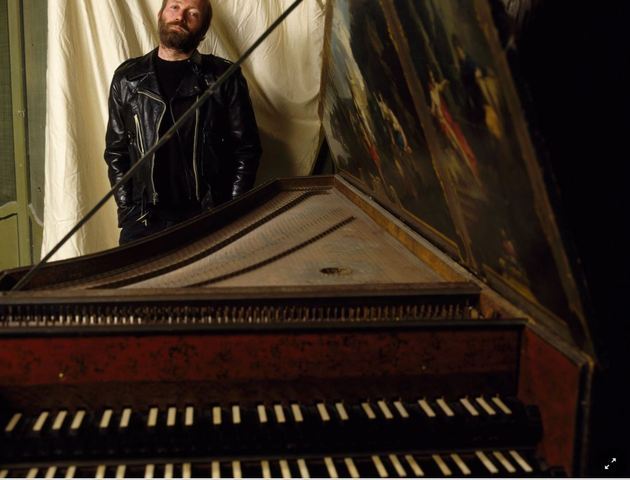
He Was a ‘Bad Boy’ Harpsichordist, and the Best of His Age
Scott Ross, who would have turned 70 this year, died young of AIDS — but not before recording all 555 Scarlatti sonatas.
By Zachary Woolfe
Feb. 26, 2021, 5:00 a.m. ET
Nicolas Bomsel was a radio producer in Paris when he had lunch with Scott Ross early in 1984.
Ross, then in his early 30s, was already one of the most eminent harpsichord players in Europe. He had burst onto the scene in 1971 with a rarely awarded first prize at the prestigious Bruges competition, then released a series of sprawling, sparkling recordings of French Baroque music: a four-LP Rameau set in 1975, 11 hours of Couperin a few years later.
A moody, troubled, brilliant American who had moved to France as a boy, Ross dressed for classes and even concerts sometimes in leather jacket and jeans, sometimes in lumberjack-plaid flannel. His clothes jarred with the buttoned-up reputation of his instrument, a courtly ancestor of the modern piano that sounded tinny and harsh under many hands, but silky, lush and bright in his.
The refined poise of his playing was ever at odds with his provocative persona, his delight in shocking friends with vulgar, outrageous conversational turns. “He was early music’s bad boy,” the conductor William Christie, who knew Ross when they were both young expatriate harpsichordists, said in an interview.
But Ross’s antics didn’t alienate him from supporters who recognized a rare virtuoso. By the time of that lunch in Paris, he was securing a relationship with Erato, the influential record label, and Bomsel asked what he planned to do with it, what his dream projects might be. The answer was stunning: Ross wanted to record the complete keyboard sonatas of Domenico Scarlatti.
“I thought it was a joke,” Bomsel recalled recently.
ImageRoss during the recording sessions for the complete Scarlatti sonatas, which sprawled over 15 months and some 8,000 takes.
Ross during the recording sessions for the complete Scarlatti sonatas, which sprawled over 15 months and some 8,000 takes.Credit...Roger Picard/Radio France
The sonatas of Scarlatti, an Italian master of the early 18th century, are relative miniatures, generally only a few minutes each, in single movements of two parts. But there are 555 of them — over 33 hours of music. The full set had never before been recorded, let alone by a single artist, let alone on an instrument like that which its composer would have known. Vast swaths were hardly played at all.
Ross’s was an endeavor of foolhardy ambition, the more so because that winter he was experiencing what he feared were the first serious symptoms of AIDS, the disease that would kill him five years later.
“But I knew him very well,” Bomsel recalled, “and he was capable to make it. It’s a crazy project, but if he says he can make it, he can make it.”
Over 15 months, in 98 sessions and some 8,000 takes — actually a dizzyingly brisk pace given the mountain of material — Ross hiked through the sonatas, which were broadcast as he progressed over the radio station France Musique. Released on 34 CDs in 1988, the set secured Ross’s legacy and helped bring Scarlatti’s immense achievement from the outskirts to the center of the keyboard repertory. Reissued in 2005, it remains a landmark of recorded music.
Ross survived long enough to finish the marathon, but not to see the full flowering of the early-music revival in which he played so colorful and important a role. Many of his best recordings fell out of print after his death. Now a kind of cult figure, beloved by many but obscure to many more, he would have turned 70 on March 1.
“He was the best harpsichordist that was playing in his generation,” said Andrew Appel, the artistic director of the Four Nations Ensemble and a classmate of Ross’s in Europe in the early 1970s. “Had he lived longer, I think he would have continued to be a more and more impressive artist.”
Born in 1951 in Pittsburgh, Ross gave his first piano recital at 5. When he was 9, his father, an editor at The Pittsburgh Post-Gazette, had a heart attack in the newsroom and died. A few years later, his mother moved her two sons to France, and Ross, by then adept at the organ, entered the Nice Conservatory, where he delved into — and increasingly concentrated on — the harpsichord.
“A friend and I used to let ourselves get locked in the conservatory at night,” he told an interviewer in 1986, “and we’d play Bach’s ‘Art of Fugue,’ four hands on a single instrument, until the janitor would kick us out at dawn.”
He had recently moved to Paris when grimness intruded again: His mother, who had returned to the United States with his older brother, killed herself on Ross’s 19th birthday, in 1970. “I spent several birthdays with him,” Appel said of the aftermath, “looking at his face, these complex clouds crossing his eyes.”
“It seemed to me at the time that the harpsichord really saved his life,” he added. “There was an urgency to the relationship between Scott, music and the instrument. Everything pure and good and honest and uncorrupted went into his playing. It was a relationship without friction, illness, ambivalence.”
Ross could be abrasive, combative, cynical, selfish and unhygienic, but he had charm and champions. He met, and became almost a grandson of, Simone Demangel, a heroine of the French Resistance who owned the Château d’Assas, an 18th-century manor near Montpellier, in the south of France. The house contained an antique harpsichord, on which Ross made his breakthrough Rameau and Couperin recordings and played many of the Scarlatti sessions.
“He loved recording,” Christie said. “If you want some kind of immortality, that’s better than dozens and dozens of concerts.”
The recordings can’t capture what is said to have been Ross’s considerable charisma in performance, but they convey the sensitivity, energy and sheer beauty of his touch. The harpsichord’s difficulties are notorious. Machine-like in its action — its interior strings curtly plucked when you depress the keys, rather than hammered and left to resonate, as in a piano — it can come across as robotic and monochromatic without a skilled interpreter.
But Ross’s sound is rich, varied and singing. A Couperin Allemande peals with organ-like juiciness, a surprise coming right after that composer’s “La Morinète,” played with the quiet strum of a guitar. Many of the Scarlatti sonatas, too, have that Spanish-descended strum: the slowly building tenderness of the 208th, the sweet and graceful 194th. Ross never rushes in these recordings, and his elegance never wavers, but you feel propelled along, energized.
“These composers had a gusto for a kind of swing in music,” Michel Proulx, the author of an impressionistic biography of Ross, said in an interview. “This was always meant as dance music, even when it was just pure music. He had that pulse, and it made it extremely alive.”
Ross’s typical style is lucid, natural and unaffected — occasionally, perhaps, a bit detached. “I found sometimes, emotionally, it was a bit cool,” Christie said. Christophe Rousset’s Rameau, for example, has more obvious élan.
But Ross’s seeming neutrality more often provides the uncanny illusion that his versions are the music itself: a pure transmission from score to ear, the musician as medium — restrained performances from an unrestrained man. And he adroitly maintains the balance between discipline and release that is central to Baroque music, particularly the French repertoire.
“There’s a friction between courtliness and passion, the restrictions of form against explosiveness of feeling,” Appel said. “Scott’s life, with all this difficult stuff and dysfunction, all put into the form of this exquisitely written music, is kind of the ideal situation to play Couperin.”
In his final years, after leaving a teaching position in Quebec City that forced him to divide his time between Canada and France, Ross moved to Assas, eventually moving from his regular room in a tower of the chateau to a small house of his own nearby. After he died, on June 13, 1989, his ashes were scattered over the town from a small airplane.
The recorded fruits of his furiously productive last period, when he knew he was very sick, kept coming out in the wake of his death. But little remains in print other than the Scarlatti and an 11-disc compilation of Bach: a slew of recordings made over his final decade, including a blazingly assured French Overture played at the Château d’Assas in 1988. Warner Music, now the owner of Erato and EMI, could reissue more of his work for those labels, which includes music by Handel, d’Anglebert, Soler and Frescobaldi. Negotiations over a new life for the Rameau and Couperin sets, originally released on the tiny Stil label, have been thornier; for now, they exist only on the secondhand market and as bootlegs on YouTube.
A film made shortly before his death captures Ross in master-class mode, teaching a few young harpsichordists. His eyes sunken and his beard thick, and wearing a baggy gray sweater and a fisherman’s knit cap, he comes across as muted, gentler than the fearsome stories suggest.
“His life was tragic in many ways,” Christie said. “I think he played the Romantic antihero, the tough rebel — you know, that real mean leather look. But he wasn’t that, really. As is so often the case.”
Ross’s pugnacious, antagonistic persona, his commitment to shocking and to being perceived as truculent and lazy: All distracted from — and all, in his final years, began to fade away before — his fierce and poignant focus, his desire to be remembered, his urgent need to communicate. In that late film, Ross sits for an interview after teaching.
“I have a quality — a vice, perhaps,” he says. “It’s called perseverance, which isn’t the same thing as patience. Patience I don’t possess, but perseverance? You’re talking to someone who recorded 555 Scarlatti sonatas. Well, that didn’t require any patience. I have no patience for anything whatsoever.”
https://www.nytimes.com/2021/02/26/arts ... music.html

